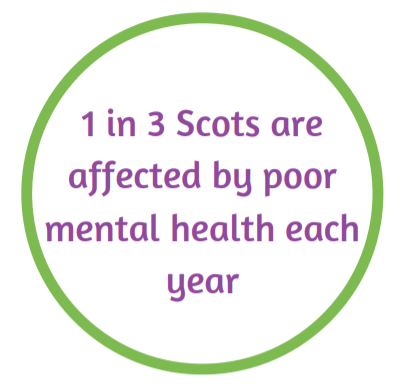Welcome to our Mental Health Toolkit
Our Mental Health Toolkit is designed to describe ways in which you can manage your mental wellbeing. You can click through to sections that appeal to you or work your way through each section.
If you feel like you may require further support with your mental health, please contact your GP. It is important to note: just because you may wish to improve your mental wellbeing does not mean that you have a mental illness.

What is Mental Health?
Mental health refers to behavioural, cognitive, and emotional wellbeing. It is all about how an individual thinks, feels and behaves; therefore when we look to improve our mental health & wellbeing, we often focus on changing or adapting our thoughts, feelings and behaviours.
Our mental health can be affected by stressors and events that may happen in our lives and it fluctuates over the course of our life. We will all go through patches in our life where we feel quite stressed or low and might need to change something to make ourselves feel content again.

Mental wellbeing, just like physical wellbeing, is something that we can all work to improve no matter what state our current wellbeing is in. We should tend to our mental wellbeing in the same way that we would tend to our physical wellbeing: regularly, with the best intentions, and in a way that suits us that we can enjoy.
Practicing Mindfulness
When we practice mindfulness, we’re practicing the art of creating space for ourselves: space to think, space to breathe, space between ourselves and our reactions.
How to Practice Mindfulness
Try this short body scan guided meditation by our lovely practitioner Clunie to bring you into the present moment and a place of calm.
Stress & Worry
We can experience stress & worry for many reasons:
Imagine Stress is like a Bucket...
Our capacity for stress is like a bucket. We all have different sized buckets with a predetermined amount of stress that we can cope with.
The size of our bucket is determined by genetics and our early life experiences. The stressors that we experience in our lives add water to our bucket and the water builds up gradually over time until it overflows. This can feel like a breaking point in our lives; where we may become angry, sad, or always on edge. We may develop difficulty sleeping or eating, and may find ourselves not enjoying things we once did or not taking time to relax.
Unfortunately, we cannot change the size of our stress bucket; but what we can do is implement helpful techniques and strategies to manage our stress in order to stop the water from overflowing and prevent a breaking point.
Can stress be a good thing?
Having some stress in our lives is essential. It is important to note that being under pressure or ‘stressed’ is a normal part of life. It can help you take action, feel more energised and get results. But sometimes these feelings could start to become a problem.
Stress is needed to keep us motivated and help us wake up in the morning; however too much can leave us feeling ‘stressed out’ and unpleasant.
We need to create a balance between the stress in our lives and the coping mechanisms that we have to deal with stress.
If the balance tips and we have too much stress but not enough coping mechanisms, we may become anxious or depressed.
Coping with Worry
Worry is a type of thought that can make us feel stressed or scared. Excessive or pesistent worry which, when impacting on daily life, may contribute to the development of stress or anxiety.
Question your Thought Pattern
Try writing down your thoughts in a diary or journal as this can help you to question them. Ask yourself - is there any other way to think about this situation? Are your current thoughts fair and realistic? If someone else had this thought - what would you say to them? What is the evidence that this thought is true? What is the evidence that this thought is false? Remember that your thoughts are not facts.
Practice Deep Breathing
See our section on Deep Breathing to learn some useful tips. Aromatherapy can also be useful. Scents like lavender, chamomile and sandalwood can be very soothing and are thought to activate certain receptors in the brain, to ease worrying thoughts.
See our section on Deep Breathing below in the "Coping with Anixety" section.
Create a Worry Time
Create a set time of the day when you allow yourself to worry. Write down any worries that pop into your head during the day and save them for your worry time. Make this time in the evening, before you put the day to rest. If you allow yourself to worry too close to bedtime then this may impact your sleep. Once your worry time is over (30-45 mins), do something to distract yourself and relax
Exercise
Walking or exercising helps to release our brain’s happy chemicals (endorphins) which can help us manage our stress and feel make us feel happier.
Psychological Therapy
Working through your thoughts, feelings and behaviours with a mental health professional in regular sessions over a set of period of time may help coping with worry, anxiety, stress or low mood.
Coping With Anxiety
When we worry or experience threatening thoughts, our brain activates our ancient survival mechanism called the "fight or flight" response. The ‘fight or flight’ response has been part of us since we were cave dwellers and prepared our bodies for action so that we could fight a predator or take ‘flight’ and run away as fast as possible. When our fight or flight response is activated, our breathing gets faster and shallower, our heart rate increases, we may begin to feel warm and sweaty, nauseous, we might start to shake and notice tension in our muscles.
Controlled Breathing
Our physical symptoms can be controlled by slowing down our breathing, signalling to our body that we are not in danger. Use our tips below, or follow the muscle relaxation tutorial from mental health charity the Samaritans.
Grounding Techniques
If we notice our worry becoming particularly upsetting, it can be helpful to draw our attention back to the present to what is in our control. See what it is like to focus on:
Loneliness
We all feel lonely from time to time, whether we live alone or with others. People feel lonely for all sorts of reasons and they are personal, so everyone’s experience of loneliness will be different.
Describing Loneliness
The best way to describe the feeling of loneliness is when our need for rewarding social contact and relationships is not met.
However, loneliness is not always the same as being alone. People may choose to be alone and be content without much contact with other people, while other individuals may find this a lonely experience.
What causes Loneliness
Loneliness has many different causes, which vary from each individual. Sometimes we don’t understand exactly what makes us feel lonely. Sometimes, certain life events can make us feel lonely, such as:
Research also suggests that individuals who live in particular situations, or belong to certain groups, are more vulnerable to loneliness. For example:
Tips to manage Loneliness
Take it Slow
If you have experienced loneliness for a long time, it can be terrifying to think about opening up to people for the first time or trying to meet new people. But you don’t need to rush into anything.
- Go somewhere you can be around people, but not expected to talk to them such as a café, the cinema, or an event. Being around other people may be enough to help with your feelings of loneliness.
- Go to a class where everyone is focused on an activity and where you are not expected to interact straight away.
Talking Therapies
Talking therapies allow you to understand and explore your feelings of loneliness which can help you to develop positive ways of dealing with them.
For example, talking therapies can provide a safe space for you to discuss the emotional problems that make it difficult for you to form good relationships.
Make new Connections
If you are feeling lonely because of a lack of social contact in your life, you could try to meet more, or different people.
- Try to join a class or group based on your hobbies or interests, or take up a new hobby.
- Volunteering is also a great way of meeting people. Helping others can also really help improve your mental health.
Try to Open Up
You might feel that you know a lot of people, but what you might find is that you may not be close to them, or they don’t give you the attention and care you need.
In this circumstance, it might help to open up about how you feel to friends and family.
If you don’t feel comfortable opening to those that you know, it might be beneficial to speak with a therapist or using a peer support service.
Coping with Redundancy & Job Hunting
We’re living in unprecedented and hugely difficult times. Worrying about the virus is made worse by worrying about the economic effects of the pandemic. The state of our mental health is often dependent on our work and financial situations; and right now many people are facing redundancy, uncertainty and fear for their livelihoods having a negative impact on our mental wellbeing